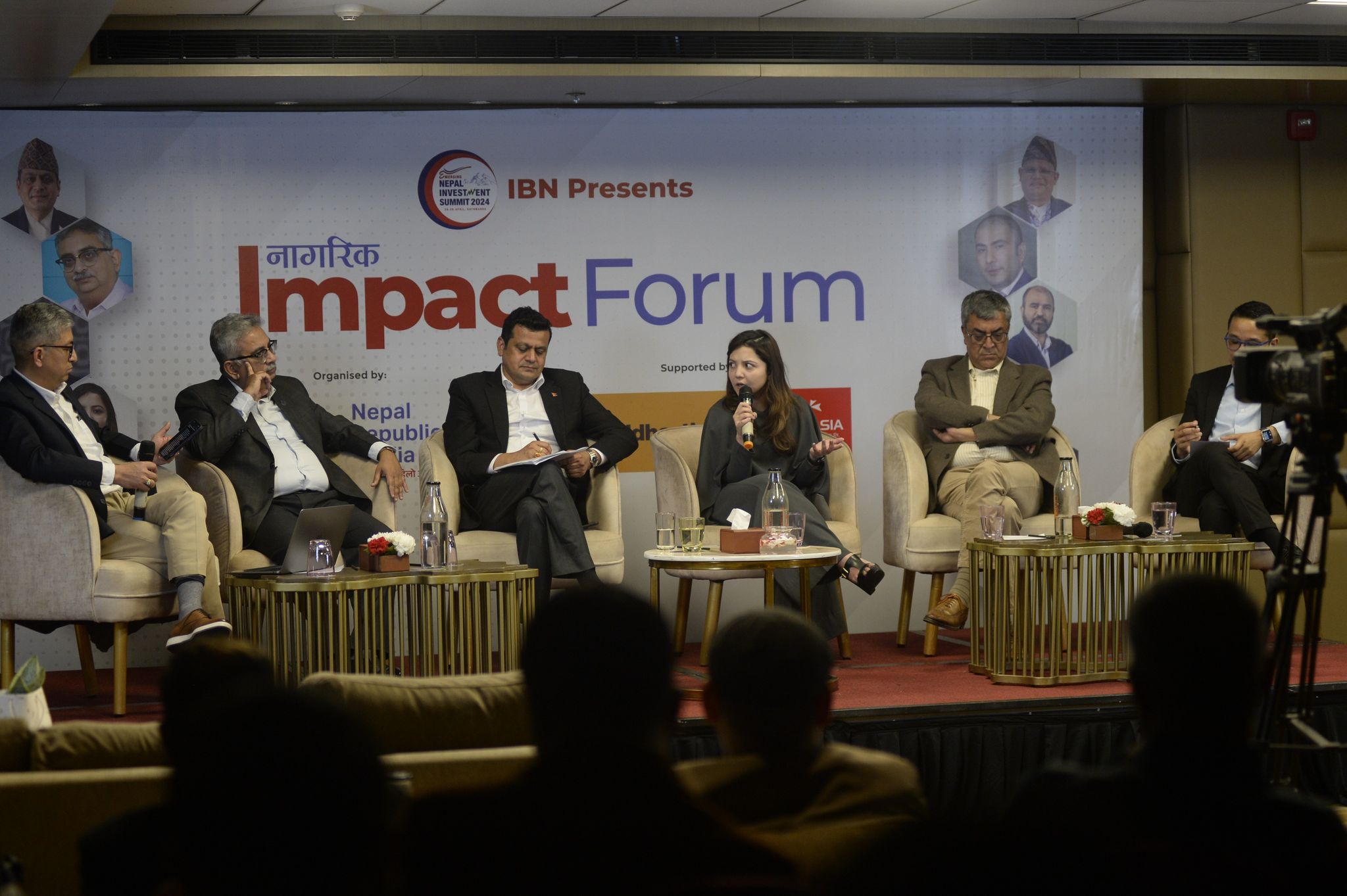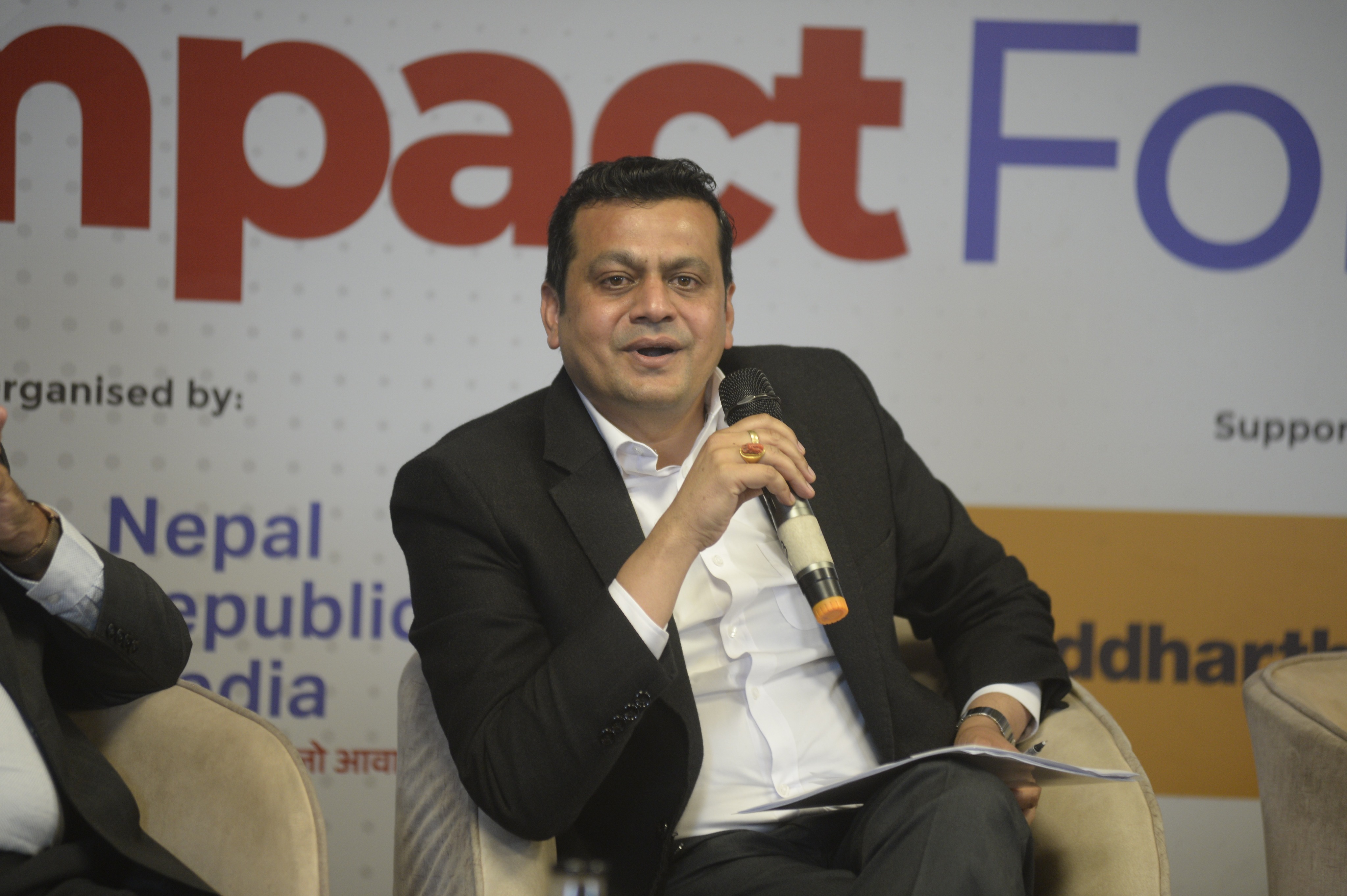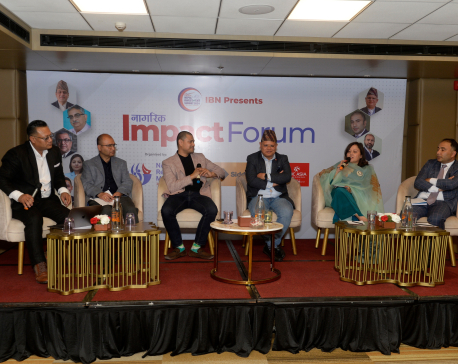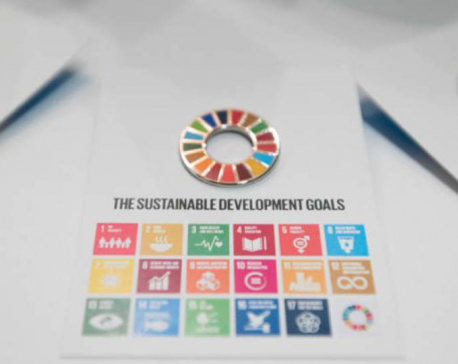
OR
#NagarikImpactForum
'Creating a conducive environment crucial for fostering investment'
Published On: March 14, 2024 07:35 AM NPT By: Republica | @RepublicaNepal

There is an urgent need to boost both domestic and foreign investments in Nepal to propel economic development and prosperity given the fact that the level of investment the country is receiving now is minimal. Nepal Republic Media Limited (NRM) collaborated with the Investment Board Nepal to organize a 'Nagarik Impact Forum' on Monday to identify challenges in attracting investments and propose measures to address them. Various stakeholders, including representatives from the private sector, experts, donor agencies, members of the diplomatic community and government agencies participated in panel discussions. The panel discussion on 'Unlocking Prosperity: Navigating Dynamics for Nepal's Economic Renaissance was joined by Amlan Mukherjee, Managing Director of Unilever Nepal, Radhesh Pant, former CEO of Investment Board Nepal, Sambridhi Gyawali, CEO of Nepal Republic Media Limited and Rabi Rayamajhi, Country Representative of British International Investment (BII). The session was moderated by Rupesh Krishna Shrestha. Excerpts of the discussions:
‘Nepal offers huge investment opportunity for potential investors’

Amlan Mukherjee
Managing Director, Unilever Nepal
I believe Unilever has charted a path to success in Nepal. I say this because, in terms of population, Nepal ranks as the 48th largest country, and in gross domestic product, it is among the 100 largest countries. Unilever saw this data as an opportunity. The statistics of being the 48th largest country in terms of population comes from combining six or seven European countries.
Unilever's focus is on producing 'soaps and soups,' essential items in daily life. We haven't ventured into anything overly complicated or sophisticated, like sending a rocket to the moon. Our products, "Soaps and Soups," are staples in every home. According to my research, we reach 9 out of 10 households every year. Our market share in Nepal is substantial. To illustrate our journey, we initiated the business with one brand and two product lines, starting 30 years ago by selling one and a half kilograms of Wheel Powder. Today, we boast a portfolio of 130 product lines, making us a modern industry in Nepal.
Every morning at 7 o'clock, I receive information on the sales of our products from 50,000 outlets through the distributor. Technology has advanced to the point where direct communication with 50,000 outlets is unnecessary; everything is monitored through GPS. We track which products go to which outlet, allowing us to manage inventory efficiently.
Unilever firmly believes in adopting the best practices globally. Last year, we conducted CAD audits in six countries, including America and Brazil. Success is achievable in Nepal, thanks to the investor-friendly environment. Operating for 30 years, we are content with our business and products, aiming to sustain this investment for another 70 years. Our faith lies in the importance of sustainability in every endeavor.
‘Time value regarding approval and related process should be considered to attract investment’

Radhesh Pant
Former CEO, Investment Board Nepal
Firstly, we need people of Nepal to understand and welcome investment. There should be consistency in policy, the leaders need to agree on projects that need to be done and have to be supported by all the parties. For large infrastructure projects, we need support from the people living there. They need to understand how these investments will help them. These are things we have not done. Simply, educate people on how investment improves their lives. Secondly, we are not basically focusing on marketing the country. We have introduced a number of programs, but we have to market these projects. We need to focus on preparing these projects. Nepal needs to negotiate with investors what those projects will give to Nepal. Then we need to come out with policies and laws that are friendly to potential investors. This means the laws are not well interpreted and there are lots of gray areas. Investors will come only to make money, for which we should be competitive. Time value regarding approval and related process should be considered.
‘Nepal can rebrand itself as power hub of clean energy and power hub of green energy’

Sushil Bhatt
CEO, Investment Board Nepal
Some reform measures and commitment of the government should be disseminated properly. It is very important for a project to come to a conclusion within a stipulated time frame. The debt capital they mobilize also has costs; so it incurs risks. We need to do effective hand-holding. IBN is one of the good forums to highlight our good works. A number of cement factories and hydropower projects that have been established in the country are good examples of this. We need to show demonstrative effect of the groundbreaking projects. Nepal has a number of success stories. We should not only talk about big industries, rather success stories of small and medium industries should also be highlighted. These also have done good branding of the country at the global forum. Rather than being a global hub of hydropower, we can rebrand as a power hub of clean energy and power hub of green energy.
‘Sustainable economic approach is a must for economic transformation’

Sambridhi Gyawali
Chief Executive Officer, Nepal Republic Media Limited
What do young people really want? They aspire to live a quality life, which involves basic necessities such as clean air and healthy food—fundamental needs for progressing in life. Looking at our total gross domestic product, 30 percent is in agriculture, and 50 percent is in services. From an investment perspective, crucial sectors include agriculture, tourism, education, and energy. Climate change is a common issue in all these sectors.
Climate change profoundly impacts various areas, affecting the country itself. Despite being one of the least contributors to carbon emissions, Nepal suffers significant impacts from climate change. Consequently, when establishing the country's goals, investments, and strategies, a central consideration should be climate change. Bringing about changes must be linked to climate change, necessitating a sustainable economic approach. In discussions worldwide, including at the World Economic Forum, the focus is on a 'low carbon economy,' with the ultimate goal being a 'net zero or low carbon' economy. Although Nepal is not considered an emerging market, it possesses a high potential energy market. Recognizing our comparative advantages—geographical location, water sources, and energy market—is essential. To foster economic development and prosperity, a significant amount of electricity is required, yet we must prioritize 'low carbon and net zero carbon' considerations.
Considering our abundant forested land (44 percent of Nepal's total land area) and ample water resources (ranking among the top 50 countries globally), sustainability in energy is imperative. The emphasis should be on renewable energy to attract investments to Nepal. Notably, asset management companies, including BlackRock, are increasingly embracing the Environment, Social, and Governance (ESG) concept. In 2022, 21.5 percent of asset management is based on the ESG concept.
In a country like ours, with rich forests, fertile lands, and high terrains, we should advocate for world leaders to transition to a 'low carbon economy' and prioritize renewable energy. While acknowledging the importance of return on investment, we should underscore a 'low carbon' policy, emphasizing environmental governance. Our aspiration is for a long-term, sustainable economy, focusing on the production and sale of renewable energy.
‘IT sector has huge attraction in Nepal’

Rabi Rayamajhi
Country Representative, British International Investment
People have started focusing more on their integrity and transparency, reevaluating their leaders. The current generations are fully aware of their rights, duties, and responsibilities, actively influencing policymakers. They are guided by a sense of what is right and what is wrong, and this ethical perspective is increasingly evident in politics—a positive shift that we desire.
Many young people aspire to study, work, or pursue various opportunities abroad, reflecting a sad reality of their reluctance to reside in Nepal. Although this trend may not change immediately, it contributes significantly to remittances in the country. It is essential to engage in discussions about what is right or wrong in this context. Based on my experience, contemporary young people in Nepal are combining education with work, leading to increased spending that benefits the country's economy. Recognizing the near-impossibility of property generation in Nepal, they are drawn to opportunities abroad.
The current generation faces numerous opportunities and benefits but desires prompt employment, which is challenging in Nepal. Additionally, a major issue is the lack of skills among the youth, hindering their ability to secure desired jobs. While the IT sector holds allure due to work flexibility and competitive salaries, this trend doesn't necessarily extend to all areas. For instance, the health sector highlights the risks associated with certain professions, such as nursing.
The workforce with training in MBA, BBA, and software courses is expanding, inspiring many to venture into self-owned businesses. Efficiency is crucial for business success. The financial ecosystem sees a growing number of youth aspiring to participate, presenting opportunities within the country.
You May Like This

'Govt should support IT and green energy investment for economic transformation'
In 2022, Nepal generated half a billion dollars through IT exports. According to IIDS research, the credibility of experts in... Read More...

Experts call for more initiatives to achieve SDGs on safe motherhood and reproductive rights
KATHMANDU, Aug 21: Experts have called for taking more initiatives regarding safe motherhood and reproductive rights by prioritizing economic development... Read More...

Tourism important means for country's economic development: DPM Pokhrel
NAWALPARASI, Feb 1: Deputy Prime Minister and Defence Minister Ishwor Pokhrel today pointed out tourism as an important way to... Read More...




Just In
- Nepal clinches thrilling victory over West Indies 'A' in T20 cricket match
- Capital Market Struggle Committee stages protest demanding protection of domestic investors (Photo Feature)
- Captain Paudel scores half-century in T20 match against West Indies 'A'
- Nine youths from Tanahu allegedly joining Russian army out of family contact for months
- West Indies 'A' sets Nepal a target of 205 runs
- Parliamentary committee directs govt to provide electricity tariff subsidies to cold storage facilities
- Former DoTM employee Bhatta arrested in connection with illegal license issuance case
- One killed in a fire incident in Dadeldhura














Leave A Comment